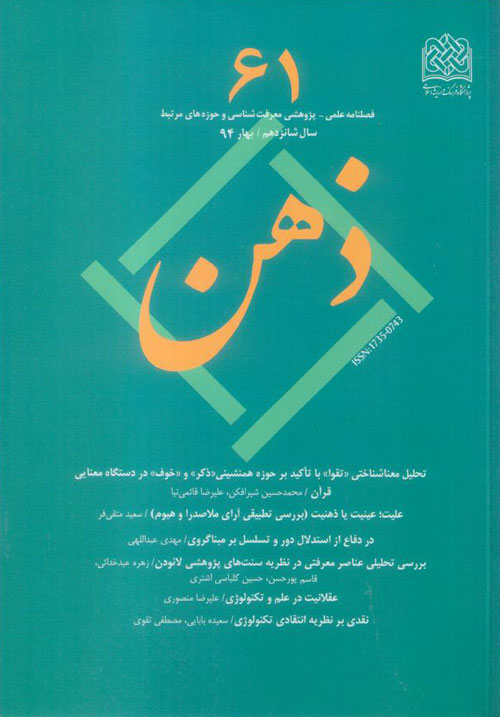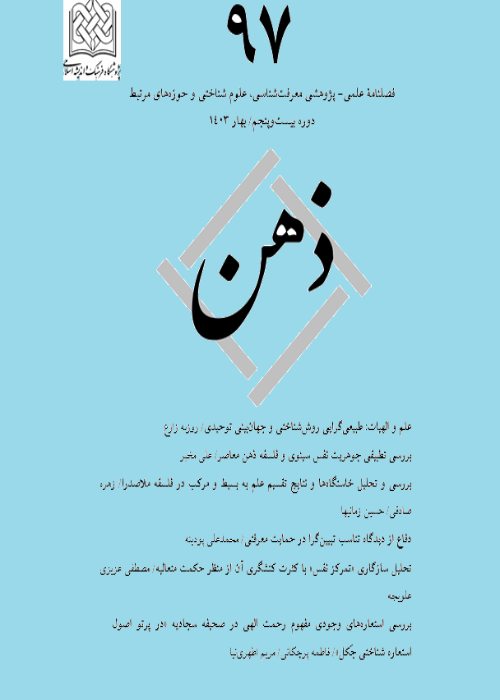فهرست مطالب

فصلنامه ذهن
سال شانزدهم شماره 1 (پیاپی 61، بهار 1394)
- بهای روی جلد: 60,000ريال
- تاریخ انتشار: 1394/06/18
- تعداد عناوین: 6
-
-
صفحه 115
-
صفحه 135
-
Page 5One of the traits composing human lofty personality is taqwa (God-wariness). Frequency of this term in the Revelation and mentions made to the ways through which this trait may be acquired show the emphasis put by the Truth on acquisition of this trait by human being. Thus, to acquire this important trait, taqwa should be recognized in the Revelation. Semantics which studies the text and analyzes the words used in the text helps us find the meaning of taqwa and its stance. In this writing, employing semantics to analyze the text of the Holy Quran in the field of syntagmatic relation of dhikr (remembrance of God) and khawf (God fearing), the authors try to analyze the stance of taqwa. Studying the relation between these notions, they will find that these are steps towards taqwa. Discussing the semantic system of dhikr and khawf and their relations to taqwa, the authors will assess the stance of taqwa in the semantic mechanism of the Holy Quran; and, it will be found that the these steps come to an end in the station of dhikr.Keywords: Semantics, Semantic field of taqwa, Syntagmatic relation with taqwa, Syntagmatic relation with dhikr, Syntagmatic relation with khawf
-
Page 27The causality always has been significant in the Thinkers View as a philosophical main Issue. Since denial or acceptance of causality have a direct effect in denial or acceptance of God Existence, as the First cause, both groups of atheist and theist philosophers have examined on this Issue seriously. Sadra According to originality of Being, believes that the Real Existence is Belong to the Self-existent who the other creatures have their own Existence from him. And Hume to deny the existence of God is Inevitable to deny the truth of causation. He with denying the fact of causation hold that what the man knows About Causality is nothing but Imaginations, association and mind habits. Based on that, the God existence imposed as manufacture of the humans mind. The atheism logically and intellectually is the Reason for Denial of the self-evident principle of causation and proof the accidence in the being of the creatures and leads to denial of the reality, Identity and existence of the being. And finally requires the sophistication and nihilism.The main fallacy of Hume in causation analysis is that he analysis the causation separate from the exact of being with the mere mentality. Whereas for correct proving and right analysis of causation it is necessary to considerate the deep link between ontology and epistemology and the relation between the mental world and the real one.Keywords: Cause, Effected, Causation, Hume, Molla, Sadra, Objectivism, Subjectivism
-
Page 59Foundationalism is the classic theory of justification and circle and regress argument is the most important argument presented by foundationalists in Islamic and western philosophy. Adversaries of foundationalism raised some objections to the argument. Some accepted the circle in justificstion; some others have claimed that the argument cannot prove the basic beliefs characters. In another objection, all beliefs arent in need to the justification; therefore the process of justification doesnt bring regress about. And another is that taking the regress for granted, such regress isnt impossible, because its chains happen gradually. Responding to these objections, this essay defends the regress argument. And shows that the argument is void of objection, and it proves the necessity of foundationalism in justification.Keywords: Foundationalism, Justification, Circle, Regress argument, Circle, Regress, Lehrer
-
Page 87Epistemology was an old issue but an important one until 1920. Since then, two main shifts has happened which caused a change in the main stream studies of the theory of knowledge. The first one is that the knowledge is not certain; this idea contradicts with the dominant thought since Plato and Aristotle. The second shift is that the essence of knowledge is in fact, the essence of the natural science. Based on this assumption, the role of nonscientific elements such as logic, metaphysics, ethics and theology fade. In the mean while, among philosophers of science Larry Laudan believes that the main challenge of the contemporary philosophers is that they ignore the importance of nonscientific elements and conceptual problems in the evaluation of a theory and a research tradition. In his view, the conceptual elements which are disseminated in the depth of a research tradition cannot be suddenly changed. The aim of the present paper is to answer the main question whether the conceptual elements find their essence in Research Tradition Model? In order to answer the question, the paper studies the role of the nonscientific elements in Research Tradition Model. To achieve this goal, at first, the paper elaborates the position of the conceptual problems in the evaluation of a theory and a research tradition and then it discusses some critical assessment of Laudans philosophy in this issue.Keywords: Larry laudan, Nonscientific, Conceptual problem, Empirical problem, Research tradition, Problem solving model
-
Page 115Control of technology is a controversial issue in Philosophy of technology. This paper aims to illustrate the aspects and consequences of the critical rationalist theory of rationality concerning technology. It will be showed the distinction drawn between facts and standards, and the differences between science and technology regarding justification, in critical rationalism, leads to the domestic considerations and moral responsibility in decisions. Moreover, useful technology, in this approach, implies the existence of democratic ground in all levels of design, construction, and control of technology.Keywords: Justificationism, Rationality, Philosophy of technology, Critical rationalism, Domestic technology
-
Page 135Due to the increasing development of new technologies and the unprecedented use of them, especially in the cyberspace domain, social and philosophical mission requires this important aspect of modern human life to be studied. In the field of philosophy of technology and technology studies, different approaches have been adopted to face this phenomenon. In this paper, In addition to introducing and criticizing the two main views in this area, namely substantivism and instrumentalism, we will discuss Andrew Feenbergs approach to face technology. Feenberg, unlike substantivists and instrumentalists, argues that technology is not autonomous or neutral and can be changed through public intervention in the process of technical designs. He believes that the existing technical system is based on capitalist values and a few groups make decision for it, while the public have the right to intervene in the formation of this system. Feenbergs solution for releasing from the modern technical space is to replace democratic values instead of capitalist values. But, despite the importance of non-negligible notion of democratic values in his theory, Feenberg leaves this notion ambiguous and dosent give a clear definition of it. This paper outlines the questions that arise from the ambiguity of the concept of democratic values and the answers to them is necessary to provide the conditions for the transformation of the technical system.Keywords: Substantivism, Instrumentalism, Critical Theory of Technology, Democratizing, Democratic values, Theory of Instrumentalization, Alternative modernity


